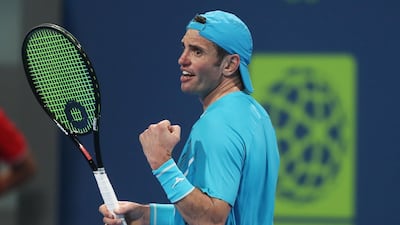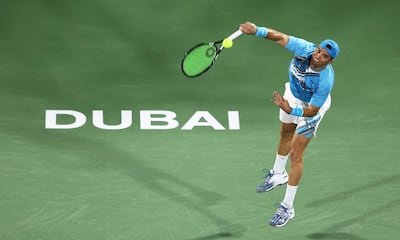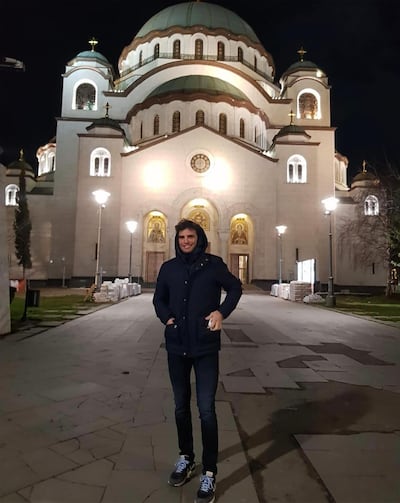Last week in Doha, as Malek Jaziri scored his first tour-level main draw victory in nearly two years, his wife was delivering their second child in Tunisia.
The 37-year-old Tunisian has not been home in nearly four months and had to miss the arrival of his daughter Mayar while he continues his quest to reignite his career and return to the top 100.
Tennis players are accustomed to making such sacrifices but even more so during Covid times, where opportunities for lower-ranked players are slim and travel restrictions can be hindering.
In 2019, Jaziri peaked at No 42 in the world rankings, the highest position held by an Arab in 15 years.
Injuries and what he describes as “bad decisions” saw him plummet outside the top 200 and he is competing in Dubai this week via a wildcard with a ranking of 258.
On Sunday, Jaziri recorded the 100th tour-level win of his career when Jo-Wilfried Tsonga retired during the first set of their opening round of the Dubai Duty Free Tennis Championships. The pair of invitations he received for Doha and Dubai, and the two first round wins he managed to get, are worth more than many people can imagine.
“For me, it means a lot. A lot of sacrifices, a lot of very deep feelings, good feelings to be back here and to play at this high level and to compete,” Jaziri said on Sunday.
“I want to be back at this high level and I keep believing that I can do it. Right now I’m 200-something in the world, and it’s not that easy. Due to corona(virus) there aren’t that many tournaments, the (second-tier) Challengers are very strong tournaments, not a lot of them on the calendar and a lot of good players are playing them, sometimes you have to play qualifying, all of these stuff … so it’s not easy.
“I really appreciate being here, I’m really grateful for Dubai Duty Free for giving me a main draw wildcard. Hopefully we keep enjoying and give the people who believe in me a lot of joy. Hopefully I’ll continue this way and insha’Allah you’ll see Malek back in the top 100.”
Mounting another comeback at the age of 37 is no mean feat and many players would have simply tapped out by now. Jaziri is not short on motivation, irrespective of where he is at in his career at the moment.
He has also relocated his training base to Belgrade where he has reunited with his Serbian former coach Dejan Petrovic.
“I don’t think about being 37, it’s not in my mind. I just want to work hard every day in something that I love. My motivation is my kids – my son (Malek Jr.) and my daughter who arrived last week. I’m making huge sacrifices. But I believe in what I’m doing,” Jaziri said.
The springboard for Jaziri’s comeback was a three-week training block he had in December at Novak Djokovic’s academy in the Serbian capital. Djokovic extended an invitation to a group of players from the region, like Filip Krajinovic, Viktor Troicki and Damir Dzumhur, as well as some juniors, to prepare for the 2021 season at his tennis centre.
Jaziri called up Djokovic, a good friend of his, to see if he could join the preseason camp, along with his coach Petrovic.
The Tunisian was at a low point at the time, struggling to string together wins on the Challenger circuit, and was in desperate need of a solid preparation period.
“I spoke to Novak, I had heard that a few players were going to go train at his academy and he was very happy to welcome me there,” Jaziri said. “God bless him. It was a great experience. I saw so many things that are very important, not only tennis-wise on court, but off court, I saw a great example of how to do things.
“It’s different when you see a player every day in practice as opposed to just having a hit with them at a tournament or at a Slam. Spending three to four weeks with these players, seeing their attitude, seeing their motivation; they always want more, they keep going.
“Novak is No 1 and he still wants to break more records and to do more. That gives me more motivation to work on myself and to believe in myself more.”
‘I’ve recaptured the spark’
Jaziri said he spoke about all sorts of things with Djokovic and was amazed at how much the 18-time Grand Slam champion was helping all the other players, giving them tips, and sharing his knowledge.
“I feel like I’ve recaptured this spark and passion. I feel like a kid wanting to learn new things and wanting to improve. I feel like I’ve improved my game so much,” he said.
“It’s very important to be surrounded by positive people and people who can help elevate you higher. And that was my idea, to be surrounded by people who are better than me at the moment, so that I can reach another level.
“I have to thank Novak for that invitation and the incredible hospitality. I also owe a lot to my coach who stood by me at a very difficult moment in my career and hopefully this will prove to be a springboard for me to go back to the high level.”
Learning from past mistakes
The thing that stands out the most when talking with Jaziri is how much he has owned up to past mistakes. The Tunisian is taking full responsibility for the decisions he made in 2019, that contributed to his decline in the rankings.
“I made some mistakes that I should not have made, especially at the level I had reached and with the experience that I have,” he admitted.
“I changed my racquets, I changed my schedule. I usually play Doha at the start of the year, instead I went to Pune. I usually come to Dubai in February, instead I went and played the clay tournaments in South America. For 10 years I had been playing certain tournaments, I knew the conditions, I was used to the weather, the flights, everything. I changed that routine when I was at my career-best ranking, 42, and that was a mistake.
“I tried doing something different, I was seeded in the South American tournaments and I had a bye, which was enticing for me. But that was a mistake, and I have to take responsibility.
“I then injured my wrist at Indian Wells. And then it just became a vicious cycle of injuries. I went to Spain for two months to get some treatment and then I went straight to court. I made a few mistakes that someone at my level should never have made. So in 2019 I lost so many points. I had so many points to defend at the end of 2019 and I dropped outside the top 200. When the coronavirus happened, the rankings freeze helped maintain me.”
It is very refreshing to see a player share his own shortcomings, and by doing so, he not only helps himself move forward, but gives others a chance to learn from his mistakes.
Jaziri now feels like he has the right attitude on court and is slowly rebuilding. His next challenge comes in the form of Serbian No 11 seed Dusan Lajovic in the Dubai second round on Tuesday.
“Now that I’m back with Dejan Petrovic, he worked with me at tough moments in the past and helped bring me back," Jaziri said. "So hopefully he can help me like that once again, getting me in the right head space, the right energy and spirit to fight for those wins."




